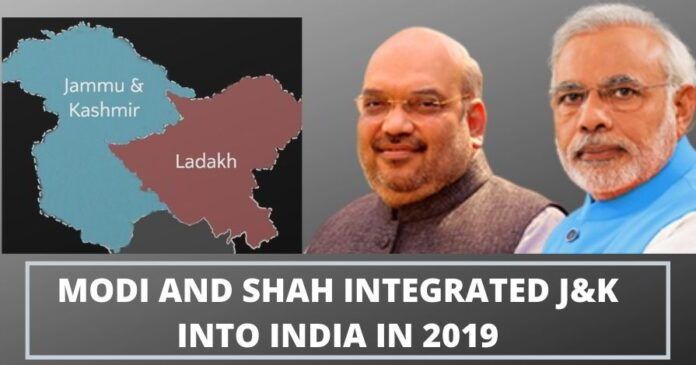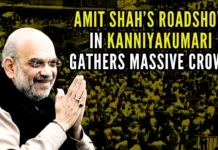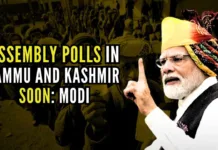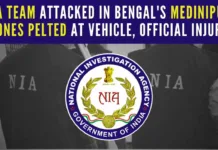
All in all, it can be said that PM Modi and HM Amit Shah will go down in Indian political history as two great leaders who did so much in such a short span
The year 2019 will go down in the political history of India as an eventful year –year that witnessed revolutionary changes, particularly after April. In May, the Indian electorate created a history of sorts. It appreciated the effective and skillful leadership of PM Narendra Modi and BJP National President Amit Shah and gave the BJP a whopping 303 seats in the Lok Sabha, 21 seats more than what the BJP won in 2014. Over 99% of seats were Hindu.
The massive mandate that Modi and Shah got was an ample proof that the nation wanted radical changes both in J&K and at the national level.
That the PM and Home Minister Amit Shah would change the course of Indian political history and bring the terrorist-infested Jammu and Kashmir (J&K) at par with other states of the Union had become abundantly clear on May 8 itself. The BJP manifesto promised abrogation of separatist Article 370 and discriminatory Article 370 and held out a categorical commitment that the BJP, if re-elected, would tread the path charted by SP Mookerjee and Deendayal Upadhaya decades ago and crush the menace of separatism and terrorism in Kashmir with a heavy hand. They had given a message to this effect on June 19, 2018, when the Modi Government brought down the militant and separatist-friendly Mehbooba Mufti Government. The Modi Government told the nation that her government had become a threat to national security and that it had utterly failed to deliver justice to Jammu and Ladakh.
The BJP election Manifesto 2019 electrified the national scene. Contrarily, the Congress took a line different from that of the BJP. As was expected, the bulk of Indian electorate swung solidly behind Modi and Shah and the result was 303 seats for it, as against the Congress’ tally of a paltry 52 seats. The BJP won Jammu and Ladakh with a huge mandate. The massive mandate that Modi and Shah got was an ample proof that the nation wanted radical changes both in J&K and at the national level. They appreciated the nature of the verdict and started treading the path they had promised.
The Modi-Shah combine took the first great step to integrate J&K and Ladakh fully into India on August 5 and 6. That eventful day, the Modi Government pleasantly surprised the whole nation, nay the international community, by doing 4 things with the concurrence or with the support of the Rajya Sabha and Lok Sabha. One, it rendered Temporary Article 370 ineffective and unreal for all practical purposes. As a result, the J&K Constitution of 1957 and separate J&K flag became stories of the past. Two, it abrogated the discriminatory and illegal Article 35A. In other words, it brought the people of the state at par with all other Indians, without any exception. Three, it segregated the strategic Trans-Himalayan Ladakh from J&K State and converted it into a Union Territory. Demand for UT in Ladakh was almost 70-year-old. And, lastly, it also converted the rest of the erstwhile leftover J&K State into a Union Territory. The most striking aspect of the whole novel situation was that the Modi Government’s change-J&K-history-steps got massive support in both the Houses of Parliament with many opposition lawmakers also voting for the official resolution and Bill and embarrassing the Congress and many other opposition political parties.
It would not be out of place to mention here that the Modi Government had taken the first step towards Ladakh’s separation from Kashmir on February 8, 2019, itself. That historic day, Ladakh was separated from the Kashmir Division and granted Divisional status. The step ended the Kashmir’s 70-year-old hegemony over the Cold-Desert region. It was on October 31 that J&K and Ladakh finally got the UT status. With this, the 173-year-old J&K State became a history. The Dogras of Jammu had built the State of J&K in March 1846 after making supreme sacrifices. The people of Jammu and Ladakh, barring a few disgruntled elements here and there, appreciated all the moves of the Modi Government and the Kashmiri Muslims of all varieties frowned but with no result.
August 5 witnessed some more major political developments. That day, three former Chief Ministers – Farooq Abdullah, Omar Abdullah and Mehbooba Mufti – along with 100s of Kashmiri politicians, including former ministers and lawmakers, separatists and pro-separatist business leaders, lawyers and members of Pro-Azadi civil society were detained. Most of them are still under detention.
The Kashmiri-Sunni-dominated successive governments in the erstwhile J&K State would enforce state holiday on July 13 and call it “Martyrs’ Day” to taunt nationalists, including Dogras of Jammu.
Earlier, the Governor’s administration in J&K and the Union Government had taken several other steps to puncture the separatists’ balloon. A reference to at least five would be in order. One, on March 2, it banned the separatist Jamaat-e-Islami, arrested many Jamaatis and also seized many of its bank accounts. The Abdullahs, the Muftis and all others in Kashmir opposed the ban. Two, it banned the dreaded Jammu & Kashmir Liberation Front (JKLF) on March 22 much against the wishes of Abdullahs and Muftis. Three, its chairman, Yasin Malik, was arrested and put in Tihar Jail (April 10). Not just this, the government reopened the 30-year-old cases of abduction and murders against him and ordered his prosecution (December 25). Four, the National Investigation Agency (NIA) and Income Tax (IT) Department raided premises of scores of separatists, traders and many others, including some lawmakers, in Kashmir and seized several documents containing vital information about break-India plans and hawala money. Scores of undesirables were put behind the bars and cases were registered against them. Five, on April 18, the Government of India suspended the cross-LoC trade. The Government said that the cross-LoC trade had been taken over by the banned terrorist organizations, especially Hizbul Mujahideen, and that even some of the Indian nationals, who had crossed over to Pakistan and joined terrorism, had floated trading firms, which were operating under control of the terror outfits. The Union Home Ministry also said that “third parties were manipulating and misusing the cross-LOC trade, which was also being used for smuggling of drugs and pumping fake currency into the Kashmir Valley”.
It is also important to note that on November 28, 2018, the Governor administration had repealed the atrocious 2001 J&K Roshni Act. Kashmiri Chief Ministers Farooq Abdullah, Mufti Sayeed, Ghulam Nabi Azad, Omar Abdullah and Mehbooba Mufti had misused this Act to change Jammu’s demography, loot and plunder lakhs of canals of state and forest land, particularly in Jammu district, and cause an immense financial loss to the state exchequer. The report of the Accountant General said that the powers-that-be-in the state allowed loot of 24 lakh of state and forest land, mostly in Jammu, and that they caused a loss to the exchequer to the tune of Rs 25,000 crores. The Account General described it as the “biggest-ever land scam in J&K”.
And on December 27, The Government of Union Territory of J&K created one more history of sorts. It with one stroke of pen scrapped the decades-old practice of observing state holiday on the birthday (December 5) of seditionist and communalist Sheikh Abdullah, as also the atrocious practice of observing state holiday on July 13 in memory of traitors and murderers. The Kashmiri-Sunni-dominated successive governments in the erstwhile J&K State would enforce state holiday on July 13 and call it “Martyrs’ Day” to taunt nationalists, including Dogras of Jammu. They were not martyrs; they were traitors and murderers of the first order. They had on this day in 1931 attacked the Central Jail in Srinagar, brutally murdered scores of innocent Kashmiri Hindus and burned down their properties, including their houses and business establishments. Not just this, the Government also declared J&K’s Accession to India day (October 26) as a state holiday. It was a humble tribute of PM Narendra Modi and HM Amit Shah to SP Mookerjee, who had all through fought for the state’s complete merger with India and died in mysterious circumstances in a make-shift jail in Srinagar on June 23, 1953.
All in all, it can be said that PM Modi and HM Amit Shah will go down in Indian political history as two great leaders who did so much in such a short span of time to undo the many past wrongs in J&K.
Note:
1. The views expressed here are those of the author and do not necessarily represent or reflect the views of PGurus.
- ‘Kashmir My core constituency’: Revisiting July 12, 2003 to understand politics, Omar Abdullah-style - March 15, 2024
- Total deviation from traditional approach: Seven takeaways from PM Modi’s March 7 Srinagar visit - March 9, 2024
- Status of political parties: Why is further J&K reorganization imperative? - March 1, 2024











You forget 1 thing – the longest internet shutdown in a democracy. This is not integration. Having won a massive mandate the BJP implemented the will of the electorate. And to have a peaceful process politicians were out under house arrest, communications banned etc etc. But after so nearly 5 months to still have so many politicians detained, still deny internet access to an entire population and deny free journalistic access is giving lots of BJP supporters second thoughts. After all in politics as in life what goes around comes around. I feel the BJP can achieve all its promises in a much more inclusive and diplomatic manner. Also it is just Year 1 of 5 years; so what’s the rush? Stagger the good news out because after Ayodhya, Article 370 and CAA only the UCC is left
[…] To Read More, Please Visit Source […]
[…] To Read More, Please Visit Source […]
Heil Modi!Heil Shah!HeilBJP!Punish The Traitors.No One Should Dare To Work Against Interest Of The Country
Please write correctly. The word you used has Nazi connotations.
It’s “Hail”
We expect many more things like Uniform civil code, liberation of Hindu temples from govt control, conversion of Hindus, population explosion, elimination of urban educated, soft ,sharp naxals, etc from the duo